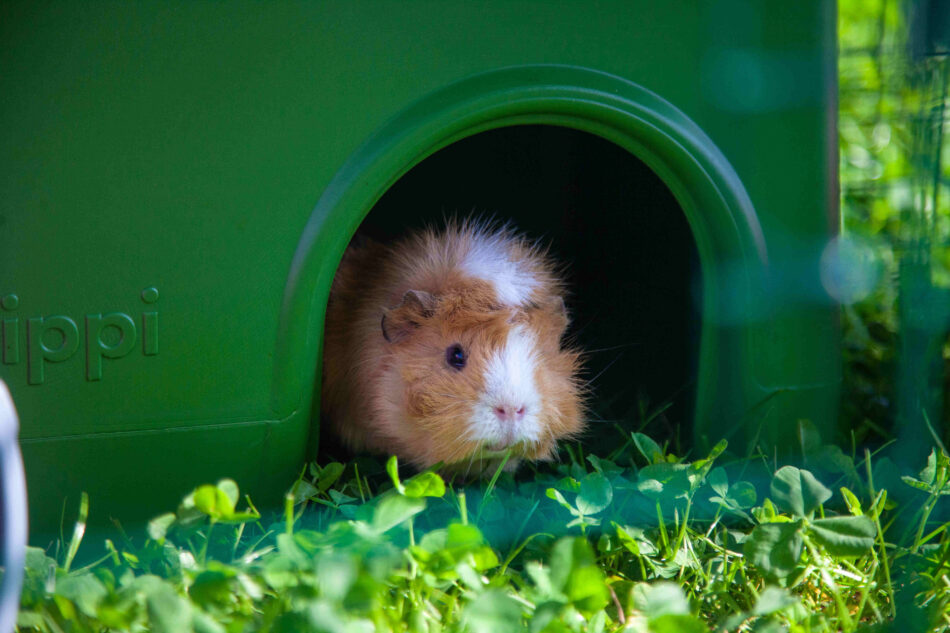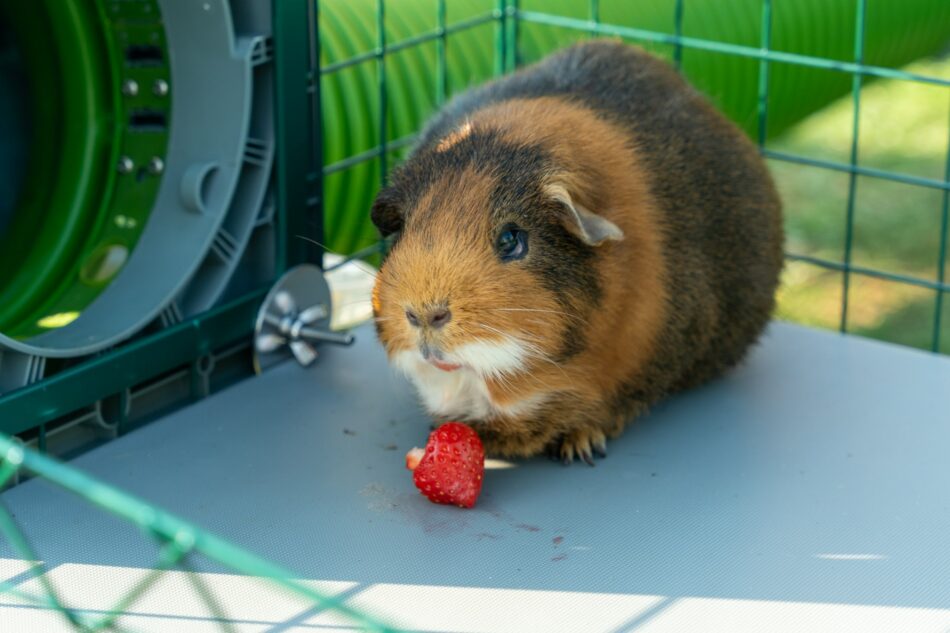What can guinea pigs eat?
Guinea pigs may be small, but they have big appetites. These little foodies enjoy a variety of offerings, but what can guinea pigs eat? The right balance in their diet helps them stay healthy and happy, and from their teeth to their tummies, they’re designed to be digesting machines with the right foods. Here’s a look at what you should (and shouldn’t) be feeding your guinea pigs.
Guinea pig anatomy
To understand what guinea pigs can eat, you have to get familiar with their anatomy, and the foods you offer them should support their unique physiological needs. There a few quirks to the inner workings of guinea pigs:
- They’re rodents, so their teeth never stop growing.
- Their digestive system is built to process lots of fibre, which is essential to keep everything moving smoothly.
- Unlike many other mammals, guinea pigs can’t make their own vitamin C, so they need it from their daily diet.
With these in mind, you’re ready to start meal planning for your guinea pigs.
The ideal guinea pig diet
Cavy cuisine doesn’t have to be complicated. Creating the right balance for your guinea pigs will support healthy metabolisms, body composition, and immune systems. Here’s what your guinea pig meal planning should look like:
- Hay (about 80%) — Unlimited fresh hay should be the foundation of your guinea pigs’ diet. Timothy or orchard grass hays are excellent choices, and when offered free-choice, will help wear down their ever-growing teeth and promote healthy digestion.
- Fresh vegetables (10-15%) — Leafy greens like romaine lettuce, bell peppers, and cilantro provide vitamins and hydration.
- Pellets (5-10%) — Choose guinea pig-specific pellets that have been fortified with vitamin C. Avoid the “trail mix” variety with artificially colored pieces or with nuts and seeds mixed in, as cavies will pick out their favourite pieces and leave the more nutritious bits behind.
- Fresh water (always available) — Clean water is just as essential as food. Make sure your guinea pigs have constant access to water to ensure they’re adequately hydrated.
In addition to these dietary staples, guinea pigs can benefit from a variety of treats — in moderation.
Supplemental foods to incorporate
Guinea pigs have a diverse palette, and can enjoy a number of fresh foods when offered sparingly. Because of their endearing potato-like build, cavies are prone to obesity, so treats should be given only occasionally and introduced in small portions to avoid digestive upset. And, when you do treat your guinea pigs, they should be safe and nutritional offerings.
Leafy greens like romaine lettuce, kale, or herbs like parsley and cilantro make great treats that pack a nutritious punch. Spinach is another good option, but should be given in moderation because of its oxalate content.
Vegetables are great additions to their diet, but not all veggies are created equally for cavies. Bell peppers, cucumbers, and zucchini are the best varieties, with the occasional carrot or sweet potato tossed in. It’s best to offer vegetables to your guinea pigs in a treat holder to reduce waste and promote slower eating.
Fruits are a little trickier for guinea pigs. They love them, and they offer nutrients, but their sugar content can cause cavies to become overweight more easily than other treats. Stick to small portions of apple slices, blueberries, or seedless orange slices no more than a couple of times a week.
What about shop bought snacks?
Commercially produced guinea pig snacks can be offered, but choose them carefully, paying special attention to their ingredients. Just like convenience snacks for humans, shop bought cavy treats are often full of sugar and lack much nutritional value. Look for no added sugars or seeds, and avoid artificial dyes or preservatives.
Safe vs. unsafe guinea pig food list
Because most guinea pigs will happily indulge in whatever food they’re offered, it’s important to know what is safe and what is unsafe for them. Here’s a quick list to consult before offering your cavy a snack:
Safe guinea pig foods to offer in moderation:
- Leafy greens — romaine lettuce, kale, spinach (in moderation), dandelion greens, and arugula.
- Herbs — parsley, cilantro, mint, basil, oregano, and dill.
- Vegetables — bell peppers (red, yellow, and green), cucumber, zucchini, carrots (as an occasional treat), broccoli, and celery (cut small to avoid strings).
- Fruits — apple (seeds removed), blueberries, strawberries, melon, pear, and orange segments.
- Other — small amounts of pumpkin or squash, and flower petals from marigolds, roses, or calendula.
Unsafe guinea pig foods to avoid completely:
- Toxic plants and vegetables — onion, garlic, chives, leeks, rhubarb, potatoes (excluding sweet potatoes), tomato leaves and stems.
- Fruits with risks — avocado (toxic), grapes and raisins (linked to kidney issues), cherries and stone fruits (pits are dangerous).
- Sugary or processed foods — bread, crackers, cereal, chocolate, or candy.
- Animal products — meat, dairy, or eggs.
- Other hazards — lawn clippings (can ferment and cause stomach upset) and house plants (many are toxic).
Dietary red flags to watch out for
Being in tune with your guinea pig will alert you if something is not right. Perform routine health checks on your guinea pigs and monitor their behaviour and appearance to see if anything is amiss with their diet. Signs of dietary issues include:
- Weight loss or sudden changes in appetite
- Diarrhea or very soft droppings
- Overgrown teeth or drooling
- Dull coat or flaky skin
- Lethargy or lack of interest in food
If you notice any of these, it’s a sign that they aren’t getting all the nutrients they need. Schedule a visit with your veterinarian to address any other underlying issues, and to tweak your cavies’ diet to promote their overall health.
Omlet and your guinea pigs
Feeding your guinea pig is just part of their care. At Omlet, we believe in creating a supportive environment for you and your cavies without complicating things. Our Eglu Go Guinea Pig Hutch, Zippi Playpens and Runs, and Zippi Tunnel System all encourage the natural behaviours of guinea pigs while keeping them safe and comfortable in any season. With a balanced diet and an ideal home, your guinea pigs will be able to live a long, happy life with you.
This entry was posted in Guinea Pigs


